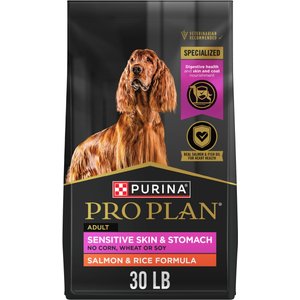Omega fatty acids and other healthy fats are an important part of your dog’s balanced diet. They provide energy, modulate inflammation, help absorb vitamins, process hormones, and promote brain and heart health.
Omega-3, omega-6, and omega-9 fatty acids can all be considered healthy fats under the right conditions. By understanding the benefits these good fats provide and how you can integrate them into a dog’s diet, you can help your pets receive the proper nutrition they need.
In This Guide:
What Are Omegas for Dogs?
Omega-3 Fatty Acids for Dogs
There are three important types of omega-3s for dogs: ALA, EPA, and DHA.Alpha-linolenic acid, or ALA, comes from plant sources, like seeds, nuts, and vegetables. This type of omega is a precursor to the other types of omega-3s, meaning the body turns ALA into EPA and DHA. Dog bodies aren’t very efficient at converting ALA to the other two types, so ALA isn’t the best omega-3 fatty acid for dogs.
Eicosapentaenoic acid, or EPA, and docosahexaenoic acid, or DHA, are much better options for dogs. These types of omega-3s come mainly from aquatic creatures such as fish and algae. EPA and DHA have a variety of health benefits and have been shown to help immune function, support heart function, help weight management, support cognitive function, and reduce inflammation.
Omega-6 Fatty Acids for Dogs
Omega-6 fatty acids are a little easier to come by in the average dog’s diet. In most cases, it’s not necessary to supplement omega-6 for dogs because they get plenty from dog food.Omega-6 fatty acids are found in animal and plant sources, even in common sources that are often included in commercial dog foods. They’re an important component in cellular structure, and they are necessary for dogs to stay healthy.
Balancing Intake of Omega-3 and Omega-6
For omegas to have maximum health benefits, intake of omega-3 and omega-6 needs to be balanced appropriately. Most dog foods don’t contain enough omega-3 to balance out their omega-6 content. To achieve the right balance, talk to your veterinarian who can provide a recommendation on adding omega-3 fatty acids your dog’s diet.Benefits of Omegas for Dogs
Omegas can be very beneficial for dogs, as well as humans, for a variety of reasons. Omegas are an essential fatty acid and a vital part of cell membranes throughout the body. Having the right amount of dietary omega supplementation can help support skin and coat health, brain health, heart health, and joint health in your furry friend.
Skin and Coat Health
One of the most commonly cited benefits of omega-6 and omega-3 fatty acids for dogs is an improvement in skin and coat health. Getting enough of these fats can help dogs with dry, itchy skin and dull coats. Omega-3 fatty acids also may be beneficial in dogs suffering from allergic skin disease.
Brain Health
Fats are brain food, and DHA and EPA have a particularly beneficial effect. We often think of supplements as being for older dogs, but senior pets aren’t the only ones who can benefit from these omega supplements. Particularly in puppies, whose brains are still developing, omega-3 supplements may be very valuable. Omega-3 supplementation may also help older dogs with brain disorders, like canine cognitive dysfunction.
Heart Health
An appropriate balance of omegas is often lauded as a therapy to improve heart health. Supplements have been shown to help dogs with arrhythmias and those with heart failure. Inflammation reduction brought on by omega-3s may also lead to better overall cardiac health.
Joint Health
Once again, the inflammation fighting powers of omega-3 fatty acids is a good thing for dog’s joints. Less inflammation means more mobility and less pain for dogs with arthritis. It can help dogs who are already dealing with joint issues, but it may also be beneficial for controlling the damage that inflammation does to joints, potentially reducing the severity of future joint problems. For this reason, many dog foods aimed at joint health have higher levels of omega-3 fatty acids than the average dog food.
Omegas for Dogs Dosage Information
The amount of omegas your dog should be taking in is dependent on several factors. The best way to get a concrete idea of the appropriate omega-6 and omega-3 dosage for dogs is to speak with your vet. They’ll be able to take into account your dog’s current health and any issues you may be able to address with omegas, your dog’s size, and their current dietary intake.
When purchasing an omega-3 food, treat or supplement made specifically for dogs, follow the dosing instructions on the label unless otherwise directed by your veterinarian.
Because DHA and EPA concentrations can vary widely, consult with your vet before give a supplement designed for people to your dog.
How To Incorporate Omegas Into Your Dog's Diet
There are several ways to safely include omegas into your pet’s diet. Before changing your pet’s diet, always check with your veterinarian.
Dog Food With Omegas
One of the best ways to make sure your dog is getting enough of each type of omega fatty acid is to feed a dog food with omega-3 fatty acids.
Because it’s harder to keep omega-3s fresh, dog foods tend to be heavy on omega-6s, but there are still options for pet owners concerned about getting the right balance.
- Purina® Pro Plan® Sensitive Skin and Stomach Salmon and Rice Formula is naturally high in omega-3 fatty acids since salmon appears first on its ingredient list.
- Hill’s® Science Diet® Sensitive Stomach and Skin Dog Food contains 0.51% omega-3 fatty acids, as well as vitamin E and omega-6 fatty acids.
Dog Treats With Omegas
Treats are another way you can make sure your dog is taking in a measurable amount of omega fatty acids.
Blue Buffalo™ Blue Bits™ boast a minimum of 0.8% omega-3 and omega-6 fatty acids, while Zesty Paws® Hemp Elements Omega OraStix™ is made from several omega-rich ingredients and supports dental health as well.
Omega Supplements for Dogs
There are a few things you should look for in fatty acid supplements for dogs:
- First, they should be made by a reputable veterinary brand that provides plenty of information about what is in the supplement, how much is in it, and how the supplement is processed.
- Second, veterinarians typically recommend fish oil for dogs over other types of fatty acid supplements.
Talk with your veterinarian about how best to incorporate the right amount of the right types of omega fatty acids into your dog’s diet. With veterinary guidance, you can pick an appropriate diet, treat, and/or supplement that will maximize the health benefits these important nutrients can provide.
This content was medically reviewed by Chewy vets.
Like this story? Check out more of our favorite reads:
Share:



















